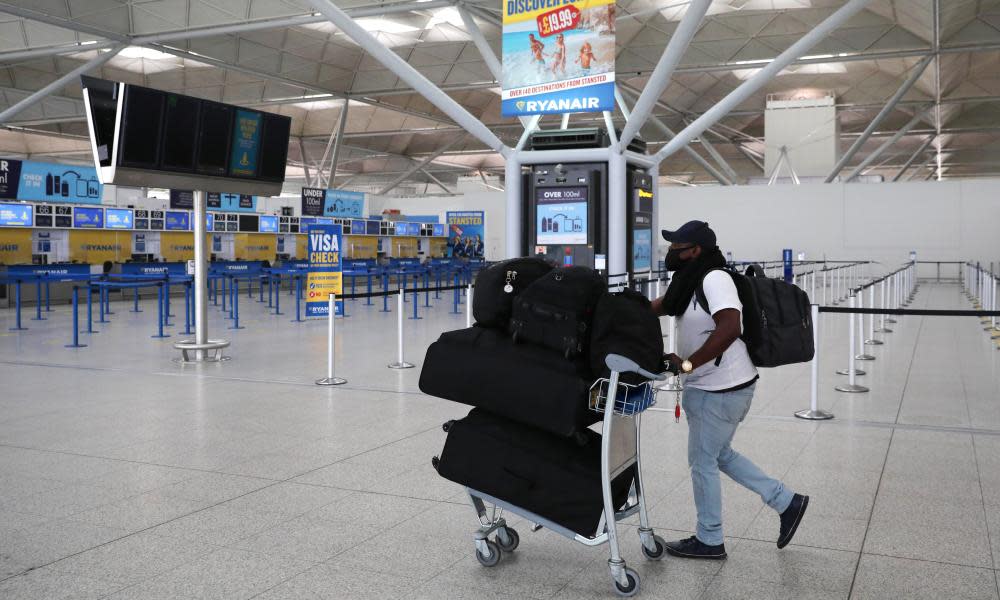England's quarantine to be dropped for Spain, Italy, France and Germany

English holidaymakers will be able to visit Spain, Italy, France and Germany without having to quarantine for 14 days on their return and travel restrictions on up to 60 other countries and territories are also set to be lifted.
The government’s rule change will come into effect on 10 July with the transport secretary, Grant Shapps, describing it as a major step in “reopening the nation”.
The full list of countries is due to be released at lunchtime on Friday.
The government had hoped for a UK-wide approach but the announcement for England-only exemptions comes after days of rows with the Scottish first minister, Nicola Sturgeon, and suggests the two governments were unable to hammer out an agreement.
The devolved nations are due to set out their own rules at a later date.
The Foreign Office’s current advice against non-essential travel worldwide will be updated, preparing the way for people to travel without quarantine restrictions from next Friday. It is expected to include the majority of EU nations as well as Turkey.
A risk assessment on selected destinations has been conducted by the Joint Biosecurity Centre, in consultation with Public Health England and the chief medical officer, Chris Whitty.
Experts have considered the prevalence of coronavirus, the number of new cases and potential trajectory of the disease in the destinations.
All passengers, except those on a small list of exemptions, will still be required to provide contact information on arrival in the UK.
“Today marks the next step in carefully reopening our great nation. Whether you are a holidaymaker ready to travel abroad or a business eager to open your doors again, this is good news for British people and great news for British businesses,” Shapps said.
“The entire nation has worked tirelessly to get to this stage, therefore safety must remain our watchword and we will not hesitate to move quickly to protect ourselves if infection rates rise in countries we are reconnecting with.”
Greece was among the countries the government wanted to set up a so-called “air-bridge” with last Friday but it announced it was banning all flights from the UK until 15 July because of concerns over the UK’s level of coronavirus cases. It is unclear whether it will make the list announced on Friday.
The government is advising that anyone planning holidays or overseas travel should always check the latest foreign office travel advice and whether there are any self-isolation measures in place for their outbound or return journey.
The exemptions from self-isolation apply to all modes of international transport, including sea and international rail routes as well as flights.
The Department for Transport said last night that the devolved administrations will set out their own approach to exemptions, and so passengers returning to Scotland, Wales and Northern Ireland should follow the laws and guidance which apply there.
The England-only rules will need further clarity as to what happens to someone who arrives into an English airport without a need to self-isolate but who then must travel to their home in Scotland or Wales, where restrictions might still apply.
The announcement comes as the UK government’s quarantine rules were branded a “fiasco” by union chiefs, who pointed to a week of delays which risked putting jobs in the travel industry at risk.
The government discussed its plan to set up “air-bridges” with a small core of Mediterranean countries on 26 June but on Thursday it emerged the list of countries was likely to be substantially larger.
“The government’s quarantine rules have been a fiasco from the outset,” said Manuel Cortes, the general secretary of the Transport Salaried Staffs’ Association.
Watch the video below
“The fact is we did not stop people coming into our country when our infection rates were very high. Then, in early June, [home secretary] Priti Patel introduced a blanket quarantine period for all arrivals when many countries had, by this point, done a far better job than our government at controlling the spread of the virus.”
On Wednesday night, the health secretary, Matt Hancock, was dispatched to try to smooth over the proposal with Scotland, which had expressed reservations, but just hours later Shapps blamed Sturgeon for holding up progress.
In transport questions in the Commons, Shapps said the devolved administrations needed to “get onboard” so the policy could be announced.
Sturgeon insisted Scotland had not been adequately consulted and that the UK’s position had changed three times in the previous 24 hours. She said the idea Scotland was responsible for delays was “completely unfounded”.

 Yahoo Movies
Yahoo Movies 
